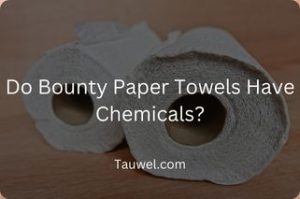This post contains affiliate links. Read the full disclosure here.
Bounty is made from trees that are turned into refined pulpwood. Similarly, long fibres of softwood trees, like spruce and pine, can also be effectively used. Cooked chips are produced after removing the bark of the plywood tree.
During this process, the natural glue which binds its fibres together tightly is effectively removed, leaving only a thick pulp fibrous mixture. Now, do bounty paper towels have chemicals in them introduced during production?

Chemicals are not used in producing bounty paper towels. Traditionally, about 100 per cent of bounty products are described as elemental chlorine-free ( ECF).
As long as the pulp is synonymous with ECF, it concludes that there is no elemental chlorine gas applied throughout the entire bleaching of the wood.
In a Hurry? Don’t go without checking this TRENDING Topic Out - 6 Best Towels For Blackstone Griddle In 2022 out
Furthermore, formaldehyde can be easily identified if it is used in bleaching wood pulp, even at very low concentrations, which is commonly utilized to ascertain that no raw material used has any trace of formaldehyde content.
Although it is claimed that the two major chemical substances present in many of the paper towels on the market have significant chlorine and formaldehyde chemicals in them, this assertion is not entirely the case, especially if you consider the methods used to identify any traces of either chlorine or formaldehyde in bounty paper towels discussed in the article.
Similarly, just like thermal paper, paper towel is said to contain significant quantities of Bisphenol A, or BPA, which is present even in paper towels that were produced from recycled paper.
Still, the same cannot be said about bounty paper towels, for their zero content of chlorine and formaldehyde or BPA plastic.
Bounty paper towels and all their accessories, like the inner cores, cartons, and paperboard packing materials are produced from recycled fibre.
Also produced from this same recycled fibre are the puffs and Charmin, which are also very easily recyclable. Now, it is a popular belief all over that Public Goods tree-free paper towels constitute a more eligible option to common paper towels designed using fast-growing non-GMO grasses like sugarcane and bamboo trees, which is most beneficial.
This is more so because inks, dyes, fragrances, and BPA are not ingredients used in manufacturing the Public Goods tree-free paper towels.
It is therefore very safe to assert that bounty towels do not contain any chemical agents like their competitors on the market.
Contents
Do bounty paper towels have formaldehyde?
Traditionally, only virgin fibres are used in producing paper towel products that are elemental chlorine-free (ECF). Since the pulp is free of any traces of elemental chlorine, then, chlorine gas is assuredly not used in the bleaching procedure.
Hence, bounty paper towels contain no chemicals including formaldehyde. Fortunately, since formaldehyde is not wanted in bounty towels, its detection in wood pulp is very easy particularly when it is in very low concentrations, and constant checks or routine investigations are conducted just to make sure that all raw materials do not contain any chlorine or formaldehyde.
Bounty towels are a product from pulpwood, after undergoing a series of treatments that has transformed the wood into cooked chips or fibres, which are devoid of any chlorine content.
Trending Searches
- Can You Use Paper Towels For Paper Mache?
- Can You Put Paper Towels In The Oven?
- Are Towels Considered Linens?
- Do Paper Towels Scratch Glass? Find Out
- What Happens If You Eat Paper Towels?
Which bounty towels are chemical-free?
Much more conveniently, ordinary paper towels produced from rapidly growing non-GMO grasses such as bamboo and sugarcane, have been largely replaced by Public Goods tree-free paper towels.
Most impressively, in the majority, if not all, Public Goods tree-free paper towels there are no inks, dyes, fragrances, or BPA.
It is a tradition that neither chlorine nor formaldehyde is added to bounty towels. After all, formaldehyde is a naturally occurring chemical substance, which can be easily detected in wood pulp even in very low concentrations, and routine checks are a constant feature of its assessment. Consequently, bounty towels are completely chlorine-free.
Do bounty towels have plastic in them?
The biodegradability of any chemical is ascertained through its decomposition in the soil over time, which is the most reliable index provided naturally.
Bounty towels and napkins are known to be fully biodegradable. Testing of their biodegradability is routinely taken using a sort of composting procedure perfected by the US Composting Council.
Under ideal conditions and all things being equal, bounty towels and any of their accessories can be easily degraded fully in only about 60 days or even less.
Fortunately, bounty towels and wrappers are also very recyclable as well, which is a tremendous benefit. Therefore, from this fact alone, it can be deduced that bounty towels do not contain any plastics in them.
Which paper towels are chemical-free?
The paper towels that are completely devoid of any chemical substances whatsoever are the bounty products. Although some paper towels other than bounty products are said to contain a significant proportion of chlorine and formaldehyde.
Just like thermal paper, some paper towels( not bounty) also contain significant quantities of BPA too, even when they are produced from recycled paper.
Specifically, completely virgin fibres are used in manufacturing all bounty products, which are, for all intents and purposes, totally free of both chlorine and formaldehyde.
They are therefore said to have no chlorine used in their bleaching during production. It is, therefore, safe to say that the bounty towels are those products that contain no chemicals in them.
They are manufactured from trees processed into plywood, in which the long fibres from softwood trees like spruce are used. Usually, after removing the barks of the trees, the pulpwood obtained from this effort is processed into cooked chips.
In the process, the natural glue which binds the fibres together is destroyed, which leaves behind only a thick and sticky fibrous pulp mixture.
Bounty paper towels suffered a severe shortage sometime ago because people went into hoarding; buying the products completely off the suppliers and storing them at home, thereby creating a sort of deliberate shortage.
What transpired was that bounty towels suddenly experienced a massive surge or increase in sales of the product sometime in July.
Consequently, Procter and Gamble complained that, because its customers have virtually cleared their stores of the product, they have become unavailable.
However, on the other hand, couldn’t the shortage have come from how the company processed its paper towels? Whichever of the two explanations you find plausible is a matter of personal conviction.
FAQs
Do bounty paper towels have chemicals?
Bounty paper towels do not have any chemicals in them. This is because all bounty products are manufactured from pulp obtained after processing plywood trees.
To ensure that chemicals such as chlorine or formaldehyde are not retained, the wood pulp is being routinely tested for any trace of their presence.
This is particularly easy since it is said that formaldehyde can be easily detected in pulp paste very clearly even when the chemical is present only in trace amounts, and these chemical checks are conducted fairly regularly.
In addition, throughout the bleaching process, even a trace amount of chlorine gas was not used at all. Only virgin or refined fibres are used in producing bounty products which are largely described as elemental chlorine-free (ECF).
Therefore, If the pulp is believed scientifically to be elemental chlorine-free, then, there possibly cannot be any elemental chlorine gas used in bleaching the wood after disbarking and processing it before the production of the pulp paste.
How bad are bounty towels for the environment?
How hazardous or environmentally safe a substance depends on a lot of factors. One, whenever any object contains certain substances that cannot be fed upon by microbial organisms in the soil, they should not be expected to decompose.
Their failure to decompose constitutes a deprivation of its nutrients to the soil, which is in itself a source of making the soil less fertile.
In other words, when a substance is biodegradable, its chemical or cellular composition will be putrefied due to the activities of microbes in the soil, and when it is decomposed, all its chemical and salt contents will be returned to the soil, a development that boosts soil fertility.
The most notable substances which do not decompose are leather and plastics. However, it is amusing to say that bounty paper towels do not contain any of either plastic or leather, which makes them as biodegradable as any other substance buried in the soil.
Therefore, in answer to the question on biodegradability, bounty towels are most assuredly free of any non-biodegradable content, which makes them safe for the environment. After all, they too, are regularly contributing to the fertility of the soil.
Do Bounty Paper Towels Have Chemicals – Conclusion
Bounty paper towels are produced from treated wood pulp in such a way that no bleaching of chemicals is allowed to contaminate the product.
Furthermore, bounty products do not contain any substance that will fail to decompose when discarded, since all their material compositions are fully biodegradable.
Through this decomposition, bounty paper towels are very contributive to the fertility of the soil, a fact which is of immense importance to the ecosystem. If you have to select, you have every reason to go for bounty towels.


